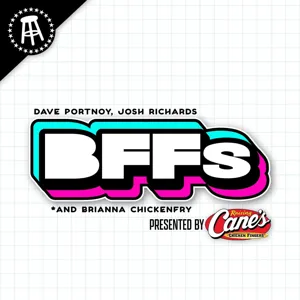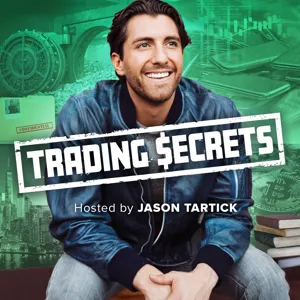Podcast Summary
The sudden disappearance of shows from streaming platforms leaves viewers feeling frustrated and denied of narrative closure: Viewers face unexpected losses when shows disappear from streaming platforms without explanation, reminding us of the impermanence of digital media and the importance of cherishing content while it lasts.
The entertainment industry's ever-evolving landscape can lead to unexpected losses for viewers, as shown by the disappearance of popular shows like "Made for Love" from streaming platforms without explanation. Em Lund's experience of being hooked on the show and then having it suddenly vanish left her and her friends feeling frustrated and denied of narrative closure. This isn't an isolated incident, as numerous shows from various platforms have mysteriously disappeared over the past year. The reasons behind these removals remain unclear, leaving viewers feeling powerless and questioning the value of their time and investment in shows they've come to love. It's a reminder of the impermanence of digital media and the importance of cherishing and appreciating the content we enjoy while it lasts.
The constant pursuit of new content in the streaming industry: Streaming platforms remove shows they've already paid for to make room for new content and stay competitive, leaving fans and creators uncertain about the future.
The economic logic behind streaming platforms removing shows they've already paid for lies in their constant pursuit of new content to attract and retain subscribers. This was evident during the time when Alyssa Nutting, the creator and showrunner of Made for Love, was trying to get her show into production. With the rise of streaming services and the shift from traditional cable to on-demand content, companies were eagerly acquiring new shows to stay competitive. Alyssa was fortunate enough to have her show picked up by HBO Max, but she soon realized that the greenlighting process was just the beginning. Running a prestige TV operation requires an immense amount of time and dedication, leaving little room for other commitments. Despite the challenges, Alyssa chose to prioritize her work, leading to the eventual production of Made for Love. However, the ever-changing landscape of streaming means that even successful shows can be taken down at any time to make way for the next big thing. This constant churn of content is the new norm in the streaming industry, leaving fans and creators alike uncertain about the future of their favorite shows.
HBO Max Removes Shows: Reasons Unclear: Despite positive reception, shows can be suddenly removed from streaming services, possibly due to corporate financial decisions, leaving creators and audiences uncertain.
The entertainment industry, specifically streaming platforms, can be unpredictable and subject to cost-cutting measures. Despite positive reviews and a loyal following, shows can be unexpectedly removed from streaming services. In this case, HBO Max, a subsidiary of WarnerMedia, removed several shows, including "The Gordita Chronicles" and "Made for Love," raising questions about the reasoning behind these decisions. Some speculation suggested that these moves were made to secure tax write-offs as part of a larger corporate restructuring deal. This theory gained traction when John Oliver joked about it on his own HBO Max show. However, the exact reasons for the show removals remain unclear. This situation highlights the precarious nature of the entertainment industry and the potential impact of corporate financial decisions on creative content.
Tax write-off theory debunked, shows can be removed without warning: Media companies can no longer write off expenses for removed shows all at once, and the unpredictability of the entertainment industry continues with sudden removals
The tax write-off theory, which allowed media companies to write off their expenses for shows taken down from streaming platforms all at once instead of spreading it over a decade, has largely been debunked. The recent changes to the tax code no longer require media companies to wait, and the potential savings on taxes would likely not outweigh the revenue they could still generate from the shows. For showrunner Alyssa, the sudden removal of her show "Made for Love" from HBO Max was a personal blow, despite the real reasons being more about industry shifts than tax write-offs. The experience underscores the unpredictability and instability of the entertainment industry, where shows can be taken down without warning and the financial implications are subject to changing tax laws and industry trends.
Streaming services save on costs by canceling shows in early years: HBO Max and others save on residuals, profit sharing, and royalties by canceling shows early in their run
HBO Max may be canceling shows to save on residuals and other financial obligations. According to David Offenberg, a tenured finance professor specializing in film and TV, residuals are fees paid to cast and crew every time a program is run, and streaming services pay an annual flat fee instead. In the early years of a show, residuals are more expensive, making it financially attractive for streaming platforms to cancel shows and save on these costs. Additionally, platforms may be cutting down on costs related to profit sharing deals with big stars and royalties for using hit songs or other intellectual property. However, it's important to note that this is just one theory, and other factors, such as the revaluation of shows, may also play a role in cancellation decisions.
Streaming industry focusing on revenue and cost reduction: Netflix's subscriber loss led to industry shift towards maximizing revenue and minimizing costs through password sharing crackdowns, subscription price hikes, and show development pullbacks.
The streaming industry's focus has shifted from endless growth to maximizing revenue and minimizing costs. This change was sparked by Netflix's first quarterly subscriber loss in a decade, which marked the end of the fantasy of an ever-growing subscriber base. As a result, streaming companies have started to crack down on password sharing, raise subscription prices, and pull back on developing new shows. This is because they have been subsidizing their streaming platforms for years to attract subscribers, but can no longer sustain these losses. Shows now need to bring in new subscribers or retain existing ones to add value to a streaming platform. The boom times for TV creators may be coming to an end as the industry matures and financial considerations take precedence over entrepreneurial decisions.
Streaming services shift strategy to retain subscribers with lesser-known titles: Streaming platforms sell underperforming shows to recoup costs and provide more options for viewers, signaling an end to the era of endless streaming content
Streaming platforms like Netflix and HBO Max are shifting their strategies when it comes to content. While blockbuster shows attract new subscribers, it's the lesser-known titles that keep them around. Shows that retain subscribers, such as "Bridgerton" followed by "Tinder Swindler," provide value to streaming services even if they don't bring in as much revenue as big-budget productions. However, shows that don't fall into these categories risk being removed from streaming platforms, as their residuals costs outweigh their value. Instead of hoarding these shows as library content, streaming services are exploring options to sell them to other platforms or even cable channels. This "yard sale theory" allows streaming services to recoup some costs while also providing viewers with more options to watch their favorite shows. Ultimately, this shift in strategy means that the era of endless streaming content may be coming to an end, as finance experts suggest that the focus on growing subscriber numbers at any cost is no longer sustainable.
Streaming landscape consolidating, causing concerns for viewers: Fewer streaming services, higher prices, and less content availability are causing frustration for viewers, with shows like 'Made for Love' being removed and unpredictability about future offerings
The streaming landscape is shifting towards consolidation, resulting in fewer services, higher prices, and potentially less content availability. This is a concern for viewers who have grown accustomed to being able to access shows on demand and share recommendations with friends. The removal of shows like "Made for Love" from streaming platforms has some viewers reconsidering their subscriptions and feeling frustrated by the unpredictability of what will be available in the future. While it's unclear what this means for the long-term viability of streaming services and the content they offer, it's important for viewers to stay informed and engaged in the conversation about the future of media consumption. If you have thoughts or experiences related to this topic, NPR would appreciate your feedback through their anonymous survey at n.pr/PMsurvey.






